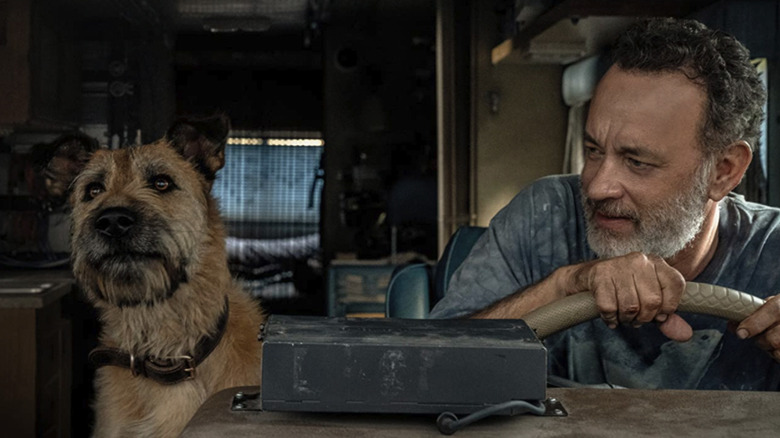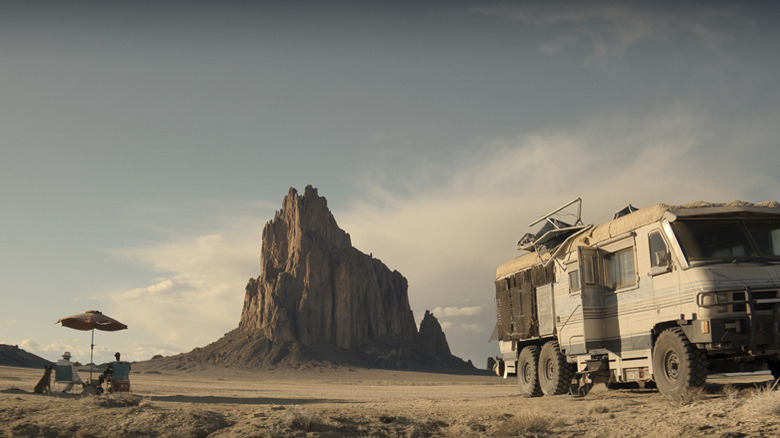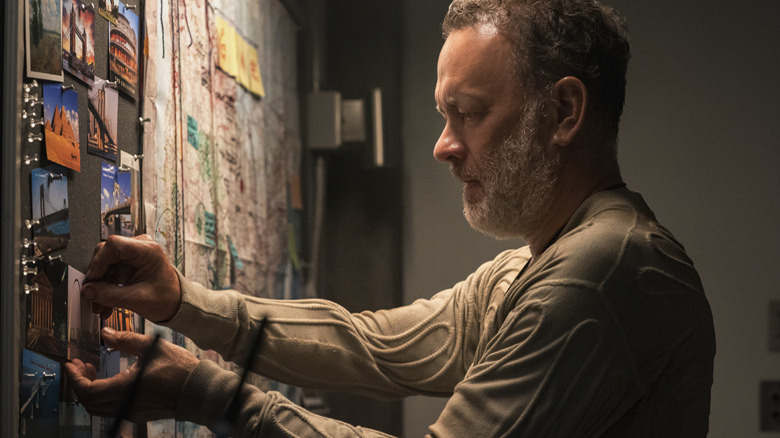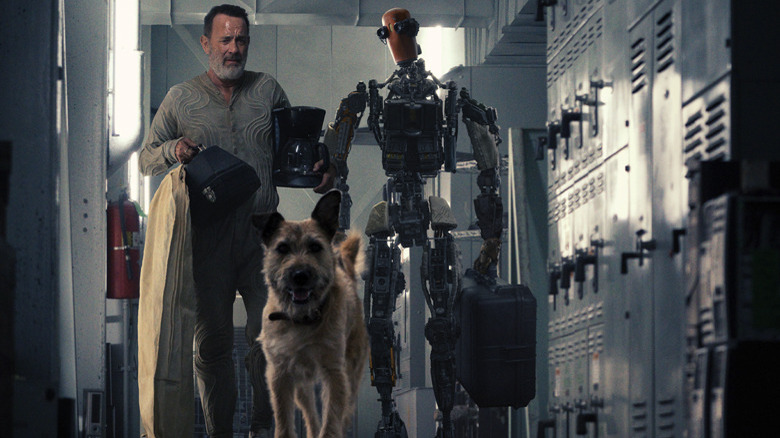Finch Ending Explained: Tom Hanks Wears A Fancy White Suit, And Jeff Dreams Of California
I've been curious if audiences would be interested in watching post-apocalyptic content with the worst moments of the pandemic still fresh in peoples' minds, but in the case of the new AppleTV+ film "Finch," the presence of Tom Hanks was seemingly enough to outweigh any hesitations folks might have had to engage with that subgenre. The movie, which hails from director Miguel Sapochnik ("Game of Thrones"), scored the biggest opening weekend for any AppleTV+ original movie so far, besting Hanks's previous movie "Greyhound" to take the top spot.
Let's take a closer look at the film's ending, how it veered away from its original plan, and if that decision ended up working out.
The Ending of Finch
A solar flare has ripped Earth's ozone layer to shreds, leading to dangerous weather events, blistering heat, and the end of society as we know it. Finch (Hanks), an engineer who knows his days are numbered due to an illness, creates a robot who's eventually named Jeff (Caleb Landry Jones) with the explicit purpose of making sure the robot will be able to take care of Finch's dog, Goodyear, after Finch dies. With a series of especially devastating weather systems bearing down on St. Louis, the gang loads up in an 1980s RV and heads for San Francisco's Golden Gate Bridge, a location that has a special meaning to Finch: his long-lost father sent him a postcard from there once, marking the only real communication he ever had from his father.
As the film rolls toward its ending, the gang stops in the desert when they realize that this particular area of the country is actually conducive to life: butterflies cruise the skies, plants grow, and humans can be exposed to the sun without it burning their flesh. Finch dons a fancy white suit (one he was planning to wear when he finally reunited with his father) and shares a roadside meal with Jeff, explaining the details of that strained parental relationship, and, in one of the movie's most resonant moments, lamenting the fact that he never made the time to explore the world. Jeff reveals that he has had his first dream: a vision of Finch, Jeff, and Goodyear on the Golden Gate Bridge. Finch teaches Jeff to play fetch with a reluctant Goodyear, but then coughs up a bunch of blood, hugs Jeff goodbye, and soon dies back in the RV.
Jeff burns Finch's body in the desert, plays fetch with a now-less-reluctant Goodyear, and finally finishes the trek to the Golden Gate Bridge, where he comes upon messages from other survivors who have left word to loved ones about a community they've formed nearby. Jeff, who had previously been told by Finch to trust no one and avoid humanity at all costs, ignores Finch's advice and decides to head out with Goodyear to find the other survivors.
"But That's Not How It Used to Be"
To quote a line from Don McLean's "American Pie," the song that opens and closes the film, "but that's not how it used to be." In fact, the director revealed in an interview with Collider that they filmed a huge amount of footage that didn't make it into the final cut.
"We shot a lot. There is a whole section that ended up on the cutting room floor that was about Jeff finally coming into contact with human beings and how they were not what he expected and certainly not what his father, Finch, had prepared him for ... and when we got to post, we were in the edit, there was a point where I realized that I knew we had reached the end of the movie but we still had more story to tell. I tried as much as I could to see if we could accommodate it, but it was a bigger story than we had time to tell in the time we had left to tell it. At some point, we just had to make a choice. To me, I believe the notion of 'kill your darlings.' I loved it. I really liked what we did. It had great actors in it. It had Samira Wiley in it, it had my wife Alexis Raben was in it, we had Skeet Ulrich in it, we had a load of people in it. And it was really good. It just wasn't the right ending for this chapter of this story. We had to let it go ... it could have been another third of a movie."
Which Ending is Better?
It's obviously tough to say whether this alternate ending would have been better than the real one, since we haven't seen any of the footage that was left on the cutting room floor. Personally, I think strong arguments could be made for both choices. As a whole, "Finch" may have felt more daring and interesting had it killed its main character two thirds of the way through and spent a lot of extra time showing how Jeff operates in the world without his "father" there to guide him. Then again, I kind of like the way other humans are treated in the current cut, where they're never explicitly seen: some are shadowy figures willing to inflict harm and take whatever they can get, while the final moments hint at an optimistic collective that has formed in California. Since I personally found the film's emotional climax to be underwhelming, I think I might have preferred to see that longer version which included more robot-human interactions.
"Finch" is streaming now on AppleTV+.



